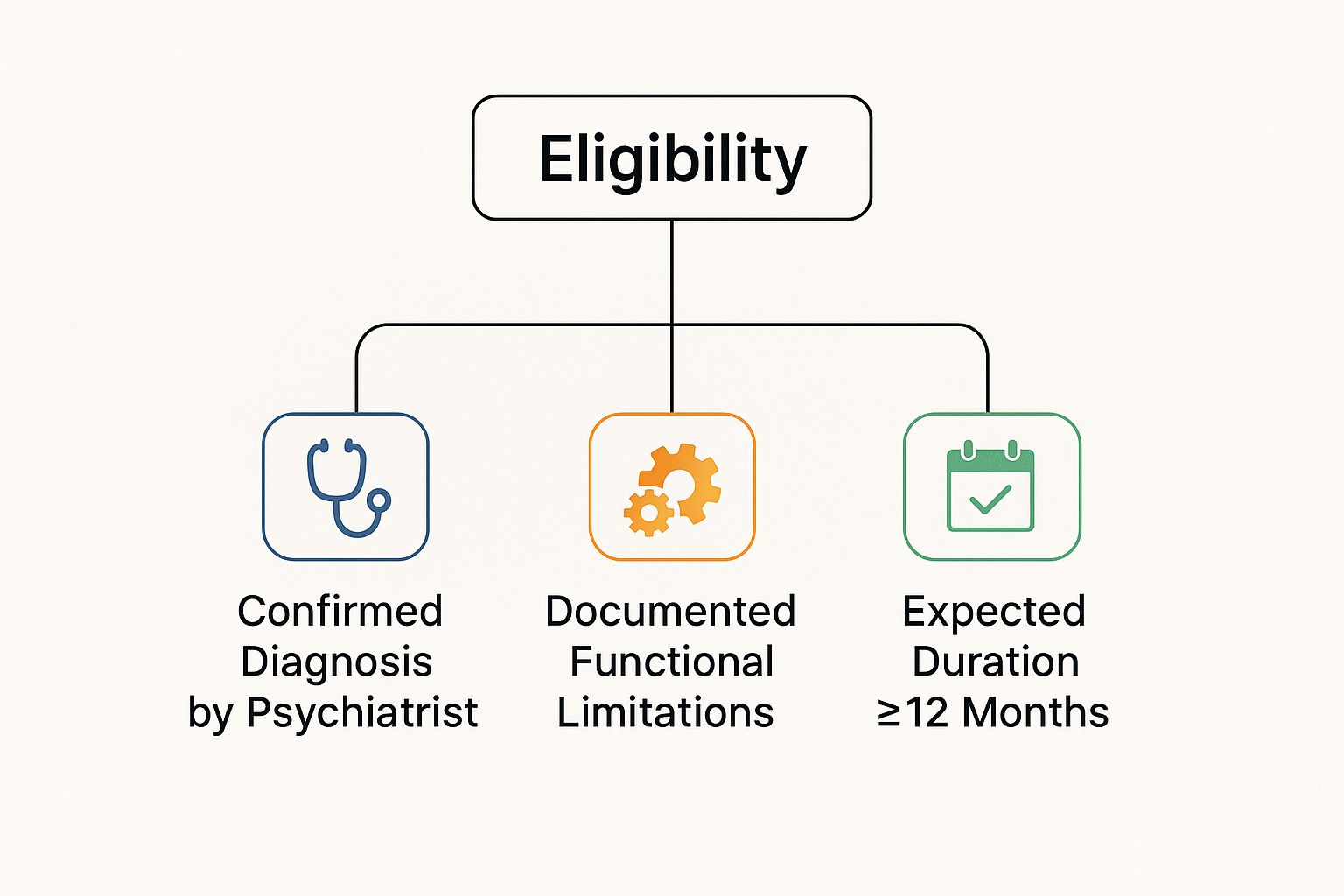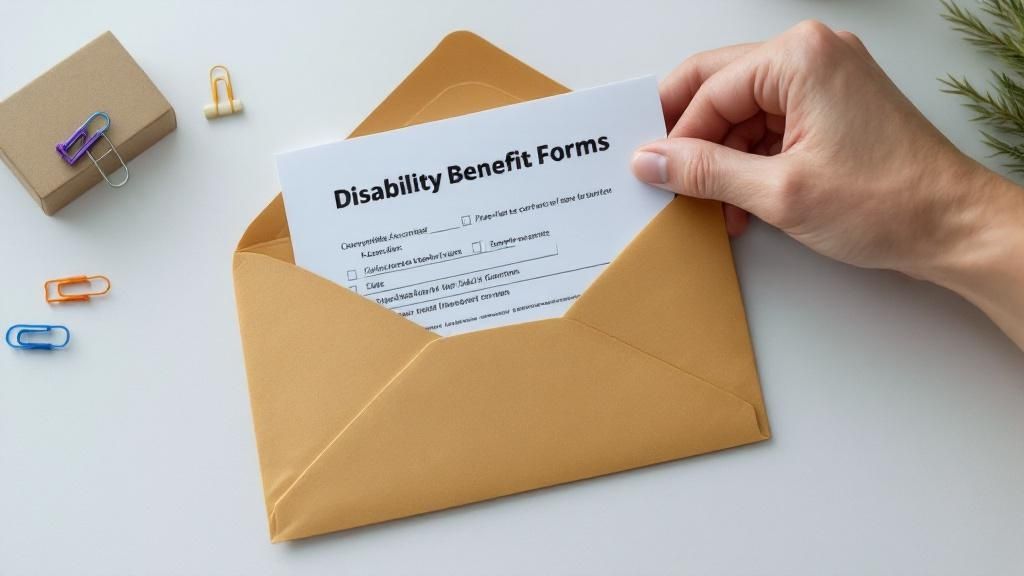Bipolar Disorder Disability Benefits A Complete Guide
"I was satisfied once John Bell took over my case."
"Communication was always timely."
Bipolar Disorder Disability Benefits A Complete Guide
Yes, it's absolutely possible to get disability benefits for bipolar disorder, but only if the condition truly stops you from being able to work. Getting approved isn't just about having a diagnosis. The key is showing the Social Security Administration (SSA) exactly how your symptoms—whether it's crippling depression or unpredictable manic episodes—make it impossible to hold down a job.
Understanding Your Path To Disability Benefits

Trying to get disability benefits when you're already dealing with bipolar disorder can feel like a monumental task. But it all comes down to a single, crucial point: you have to connect the dots between your diagnosis and your inability to work. Think of it as building a story, piece by piece, that shows a consistent pattern of how the disorder affects your day-to-day life and ability to function.
This isn't just about telling the SSA you have "good days and bad days." Everyone has those. It's about proving that the extreme, unpredictable swings of bipolar disorder make sustained, full-time employment completely unrealistic for you. The SSA will look closely at the severity of your condition, including the anxiety and depression that often come with it, and whether coping strategies for anxiety and depression are enough to get you through a workday.
To help you get a clearer picture of what the SSA is looking for, here's a quick breakdown of the core components of a successful claim.
Quick Guide Bipolar Disorder and Disability Eligibility
| Medical Diagnosis | You must have a formal diagnosis from a qualified medical professional, like a psychiatrist. | A diagnosis is the starting line, not the finish line. |
| Functional Limitations | This is the core of your case. You need to show how your symptoms limit your ability to perform basic work tasks. | It's not the diagnosis that gets you benefits, but what the diagnosis prevents you from doing. |
| Work History | The SSA will look at your past work to see if you can still do those jobs or be retrained for something less demanding. | The goal is to prove you can't perform any kind of substantial gainful activity. |
| Treatment History | A consistent record of treatment, medication, and therapy shows you are trying to manage your condition. | Following your doctor's orders is critical to a strong claim. |
This table is just a snapshot, but it highlights that a successful claim is built on a foundation of solid evidence and a clear narrative.
Proving Your Inability To Work
To build a case that the SSA can't ignore, you have to focus on how your bipolar symptoms specifically interfere with basic, work-related abilities. They want to know the practical impact of your condition.
Here are the kinds of questions they'll be asking:
- Concentration and Pace: Can you actually stay on task for a full workday? Or do your symptoms pull your focus away so much that you'd be considered "off-task" more than 15-20% of the time?
- Social Interaction: How do you handle being around people? Manic and depressive episodes can make dealing with bosses, coworkers, or the public nearly impossible.
- Adaptability: How do you cope with change? Simple things like a new process or a different schedule can be major triggers for someone with bipolar disorder.
Bipolar disorder is a serious condition, recognized as a leading cause of disability worldwide and affecting an estimated 40 million people as of 2019. The SSA is very familiar with it, but that just means they have a high standard for the proof they require. You have to show them your specific story.
You can learn more about what qualifies for disability benefits in our detailed guide to get a better sense of the overall requirements.
Meeting The SSA Blue Book Listing For Bipolar Disorder
When the Social Security Administration (SSA) looks at a disability claim for bipolar disorder, they turn to their own medical guide, which they call the "Blue Book." It’s basically a massive checklist of conditions and the specific criteria needed to qualify for benefits.
For bipolar disorder, your case will fall under Listing 12.04, Depressive, bipolar and related disorders. The best way to think of this listing is as the SSA’s rulebook. If your medical records check all the right boxes, you can be approved for benefits right away, without having to prove you can't do any other kind of work.
To meet the requirements, you need to satisfy the criteria in Paragraph A and Paragraph B. If that doesn't quite fit, there's another path: satisfying Paragraph A and Paragraph C. It’s a very structured process, and having the right evidence for each part is absolutely essential for getting your bipolar disorder disability benefits approved.
The infographic below breaks down the core pieces the SSA is looking for: a solid diagnosis, well-documented limitations, and proof that the condition is long-term.

As you can see, simply having a diagnosis is just the starting line. The real challenge is proving exactly how the condition prevents you from being able to work.
Paragraph A Requirements: The Symptoms
First things first, Paragraph A is all about your official diagnosis and the symptoms that come with it. You have to show the SSA that your medical records document a bipolar disorder that includes at least three of the following symptoms:
- Pressured speech
- Flight of ideas
- Inflated self-esteem
- Decreased need for sleep
- Distractibility
- Involvement in activities that have a high probability of painful consequences
- Increase in goal-directed activity or psychomotor agitation
These aren’t just descriptions of a tough week; they are clinically recognized signs of a manic or hypomanic episode. The key here is that they must be documented in your medical records. It’s not enough to just say you experience them—your psychiatrist’s notes need to clearly connect these specific symptoms to your bipolar diagnosis.
Paragraph B Requirements: The Functional Limitations
Once you’ve met the criteria in Paragraph A, the SSA then wants to know how these symptoms actually impact your ability to function. This is truly the heart of your claim.
Paragraph B requires you to have an "extreme" limitation in one of the following areas, or a "marked" limitation in two of them:
Understanding, Remembering, or Applying Information: Think about your ability to follow instructions, learn new things at a job, or make sound judgments.
Interacting with Others: This is about getting along with supervisors, coworkers, and the public without causing conflict or disruption.
Concentrating, Persisting, or Maintaining Pace: This covers your ability to stay focused on a task and complete it in a reasonable amount of time without getting sidetracked.
Adapting or Managing Oneself: This area deals with controlling your emotions, managing your behavior, and keeping up with personal hygiene and self-care.
What’s the difference between "marked" and "extreme"? A marked limitation means your ability in that area is seriously limited. An extreme limitation means you essentially have no ability to function in that area at all. Proving this requires detailed notes and opinions from your doctors, therapists, and other treating sources.
Paragraph C Requirements: The Alternative Path
So, what happens if your condition is clearly severe, but you don't neatly fit the boxes in Paragraph B? That's where Paragraph C comes in. It provides another way to qualify.
This path is for people who have a medically documented history of bipolar disorder that has lasted for at least two years. You also have to show that even though you are in ongoing treatment that helps manage your symptoms, you still have what the SSA calls "marginal adjustment."
In plain English, "marginal adjustment" means you have very little capacity to adapt to changes. You might be able to handle your structured daily routine, but you can’t cope with new demands or unexpected changes in your environment. Given that an estimated 4.4% of U.S. adults experience bipolar disorder, this alternative is a critical piece of the puzzle for many disability claims.
How a Medical-Vocational Allowance Can Win Your Claim

What happens if your medical records don't tick every single box on the Social Security Administration's (SSA) strict checklist? Don't lose hope. Many, if not most, successful claims for bipolar disorder disability benefits don't. This is where another path opens up: the medical-vocational allowance.
Instead of just checking boxes, this process takes a much closer look at what you can realistically do despite your condition. The SSA assesses your Residual Functional Capacity (RFC), which is basically a detailed inventory of your remaining abilities to function in a work environment.
Think of your RFC as a translator. It takes all your documented symptoms—the debilitating mood swings, the social anxiety, the trouble concentrating—and translates them into concrete, real-world workplace limitations. It paints a picture of the kind of work you can still handle, if any at all.
Defining Your Work Limitations
The RFC assessment is incredibly specific. An SSA claims examiner, usually with input from a medical consultant, will comb through your entire file to figure out exactly what your limitations are.
These aren't just vague statements. They are direct and often quantifiable restrictions that might look something like this:
- Pace: You might be off-task more than 15% of the workday because of depressive symptoms or an inability to focus.
- Interaction: Your condition may require a job with only occasional and superficial contact with the public or coworkers.
- Attendance: Unpredictable episodes could force you to miss more than two days of work per month, on average.
- Supervision: Cognitive challenges might mean you can only handle simple, routine tasks with very little direct oversight.
Pinpointing these restrictions is critical because it establishes what you can't do. This shifts the entire focus from a rigid medical definition to a practical assessment of your day-to-day abilities, using your work history and medical records as the guide.
A medical-vocational allowance changes the question from, "Do you meet this exact medical definition?" to something much more practical: "Considering your age, education, past work, and specific limitations, is there any job out there in the national economy you can still perform?"
Combining Your RFC with Other Factors
Once your RFC is set, the SSA doesn't stop there. They combine it with several other key pieces of your profile: your age, your education level, and all your past work experience. This final step is guided by a set of SSA guidelines often called the "grid rules."
For instance, the SSA might figure a younger person with a college degree could adapt to a new, simpler job. But for an older individual with less education and a long history of physical labor, the options are far more limited.
If your RFC limitations, when combined with these other factors, prove you can't go back to your old jobs or switch to some other type of work, the SSA will approve your claim through a medical-vocational allowance. It's a vital and often-used pathway for securing the benefits you need.
Building a Strong Case With the Right Medical Evidence

Simply having a diagnosis for bipolar disorder is just the starting point. To win your bipolar disorder disability benefits, you need to build a rock-solid case file. Think of it like a puzzle. The SSA examiner needs to see the full picture of how your condition truly impacts your daily life and, most importantly, your ability to hold a job.
Your personal account of your struggles is important, but it's the objective medical evidence that carries the most weight. Your goal is to provide a mountain of consistent, detailed proof that leaves no doubt in the examiner's mind. It's about showing, not just telling, them how severe your limitations are.
Essential Medical Evidence Checklist
Gathering the right paperwork is arguably the most critical step in this entire process. Each document you submit helps to paint a clearer picture of your condition over time. A strong claim file needs a variety of records that work together to tell a complete and compelling story.
Here is a checklist of the essential medical and non-medical documents you'll need to start collecting.
| Longitudinal Psychiatric Records | These ongoing notes from your psychiatrist or psychologist create a timeline, showing the history of your symptoms and your response to treatment. They are the backbone of your claim. | Your psychiatrist's, psychologist's, or therapist's office. |
| Hospitalization Records | Inpatient records from manic or severe depressive episodes provide powerful, objective proof of the severity and instability of your condition. | The medical records department of any hospital where you were admitted. |
| Pharmacy Medication History | This detailed list shows every psychiatric medication you've been prescribed. It proves you're following treatment and can also demonstrate when multiple medications have failed to work. | Your local or mail-order pharmacy can print this for you. |
| Psychological Testing Results | Formal evaluations provide objective data on how your condition affects your memory, concentration, and ability to follow instructions—all key work-related functions. | The office of the psychologist or neuropsychologist who performed the testing. |
| Statements from Friends/Family | Third-party accounts can corroborate the functional limitations you experience at home and in social settings, adding a layer of credibility to your own reports. | Ask a trusted friend, former co-worker, or family member to write a detailed letter. |
Putting together a file this comprehensive takes time, but it’s the best way to ensure the SSA has everything they need to make the right decision.
The Power of Your Doctor’s Opinion
While all these documents are vital, a detailed statement from your treating psychiatrist can be the single most persuasive piece of evidence you submit. This isn't just a letter saying you have bipolar disorder; it's a specific form (often called a Residual Functional Capacity or RFC form) that translates your medical diagnosis into work-related terms.
A strong statement from your doctor will explain exactly how your symptoms prevent you from concentrating, getting along with coworkers, or staying on task consistently. Getting this right is crucial, and understanding the principles of clinical documentation improvement can make a world of difference. This targeted opinion from an expert who knows you best is often what tips the scales in favor of an approval.
Navigating The Disability Application And Appeals Process
The path to getting Social Security disability benefits is almost never a straight line. It's really a multi-stage journey, and frankly, it often involves getting denied before you get approved. Knowing this from the start can take a lot of the stress out of the process and help you get ready for what's ahead.
Think of it less as a single application and more as a series of opportunities to build and prove your case.
It all starts with the initial application. At this point, a state-level examiner at Disability Determination Services (DDS) will go through your medical records and all the other evidence you've submitted. The hard truth is that a huge percentage of first-time claims for mental health conditions like bipolar disorder are denied. This usually happens because the medical evidence wasn't strong enough or didn't clearly show how the symptoms prevent you from working.
The Reconsideration And Hearing Stages
When you get that first denial letter, your immediate next step is to file for reconsideration. This just means a different DDS examiner takes a fresh look at your file. While it's a required step, don't get your hopes up too high—most claims that were denied the first time get denied again here. This is the point where a lot of people feel defeated and give up, but you have to keep pushing forward.
For most people, the most important part of the entire process is the hearing in front of an Administrative Law Judge (ALJ). This is, by far, your best chance to win your disability claim. Unlike the paper-shuffling of the earlier stages, the hearing is your chance to appear in person and testify about how your bipolar disorder truly affects your daily life. The judge will ask you questions directly, and your attorney can make a compelling legal argument for you.
Your ALJ hearing is often the first and only time you get to speak directly to the person deciding your case. This is your chance to move beyond the paperwork and share the real-world impact of your bipolar disorder, explaining how mood swings, cognitive fog, and anxiety make sustained work impossible.
Preparing For Your Day In Court
An ALJ hearing isn't as formal as what you see in a courtroom drama on TV, but it does follow a specific structure. The judge will probably ask you very detailed questions about your symptoms, what you do on a typical day, your treatment history, and your past jobs. There will also likely be a vocational expert there who will give testimony on what kinds, if any, of jobs someone with your exact limitations could do.
Getting through this process on your own is tough. The deadlines are incredibly strict, and the rules about evidence can be bewildering. A lot of people find that having an experienced disability lawyer to handle the paperwork, prepare them for the judge's questions, and argue their case makes all the difference. If you've been denied, you need to act fast. You can find critical information on how to appeal a disability denial to make sure you don't miss any crucial deadlines.
How a Disability Lawyer Can Make All the Difference
Trying to navigate the Social Security Administration’s maze of rules is a huge challenge, especially when you’re already focused on managing your health. This is where bringing in a professional can change everything. An experienced disability attorney doesn't just fill out forms; they dramatically improve your chances of getting the bipolar disorder disability benefits you need.
Think of your attorney as a translator. They take the story of your daily struggles with bipolar disorder and convert it into the specific legal language the SSA understands and requires. They know precisely what kind of evidence convinces an Administrative Law Judge and how to frame it. This means they’ll work with your doctors to get medical opinions that go beyond just a diagnosis, clearly explaining how your symptoms limit your ability to function.
Building Your Case and Representing You at the Hearing
One of the most valuable things a lawyer does is prepare you for your hearing. It can be an intimidating experience, but your lawyer will walk you through the kinds of questions the judge is likely to ask. This preparation helps you give clear, honest, and effective testimony about how your condition truly affects your ability to hold a job.
When it comes to the hearing itself, your lawyer brings expertise you simply can’t replicate on your own. They will:
- Develop a Strong Legal Argument: They connect the dots between your medical records, your doctor's opinions, and the specific SSA rules that apply to mental health conditions.
- Challenge the Vocational Expert: The SSA will almost always have a "vocational expert" at the hearing who will list jobs they think you can do. Your lawyer knows how to cross-examine this expert, pointing out how your non-exertional limitations (like problems with focus, interacting with others, or managing stress) make those jobs impossible for you to sustain.
Here’s a crucial point: most disability lawyers work on a contingency fee basis. This means you pay no attorney's fees unless you win your case. There's no upfront cost, which means you can get expert legal help without any financial risk.
By taking on the deadlines, the mountain of paperwork, and the legal strategy, a lawyer frees you up to focus on what matters most—your well-being. They do the heavy lifting so your claim is presented in the strongest way possible.
Frequently Asked Questions About Bipolar Disability Benefits
When you're trying to navigate the system for bipolar disorder disability benefits, it’s only natural to have a lot of questions. Getting straight answers can make a world of difference, giving you the clarity you need to push forward. Here are some of the most common things people ask.
Can I Still Get Benefits If I'm Working Part-Time?
It's possible, but you have to be extremely careful here. The Social Security Administration (SSA) has a very strict income rule they call Substantial Gainful Activity, or SGA. If the money you earn from a part-time job goes over this limit, the SSA will almost always decide you're not disabled.
For 2024, that magic number is $1,550 per month. Earning even a little bit over that can sink your entire claim, so you absolutely have to keep a close eye on your income.
What Happens If I've Been Denied Before?
Don't panic—a denial is not the end of the road. In fact, most first-time applications are denied, so you're in good company. You generally have two paths forward, depending on where you are in the process.
- Appeal the Decision: If you just got your denial letter, you have a 60-day window to file an appeal. It's critical to act quickly to move your case to the next stage.
- File a New Claim: If that 60-day deadline has passed, your best bet is to start a new application. This can be a smart move, especially if your bipolar disorder has gotten worse or you now have stronger medical evidence to back up your claim.
It's easy to see a denial as a final "no," but it's really just a hurdle. With the right approach—whether that’s a quick appeal or a fresh application packed with new evidence—you can get past it and keep fighting for the benefits you need.
How Long Does This Whole Process Actually Take?
This is the tough part. The timeline can be frustratingly long, and it really depends on where you live. You can usually expect an initial decision within three to six months.
But if your claim gets denied and you have to go through the appeals process all the way to a hearing with a judge, the entire journey can easily stretch out to one or two years—and sometimes even longer.
Trying to manage this complex process on your own can feel completely overwhelming. The experienced attorneys at Bell Law can walk you through every single step, from filing the first forms to representing you at a hearing. Contact us today for a consultation and let us help.
Disclaimer: The information on this page is provided for general informational purposes only and is not legal advice. Reading this content does not create an attorney-client relationship. For advice about your specific situation, please contact a licensed attorney.







